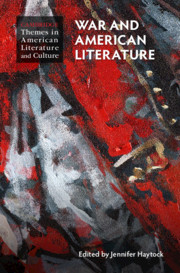Book contents
- War and American Literature
- Cambridge Themes in American Literature and Culture
- War and American Literature
- Copyright page
- Contents
- Contributors
- Acknowledgments
- Chronology
- Introduction
- Part I Aspects of War in American Literature
- Part II Cultural Moments and the American Literary Imagination
- Chapter 8 Liberty, Freedom, Independence, and War
- Chapter 9 Indians, Defeat, Persistence, and Resistance
- Chapter 10 Civil War Literature and Memory
- Chapter 11 African American Literature, Citizenship, and War, 1863–1932
- Chapter 12 World War I and Cultural Change in America
- Chapter 13 On the Home Fronts of Two World Wars
- Chapter 14 Patriotism, Nationalism, Globalism
- Chapter 15 The “Good War” Script
- Chapter 16 The Vietnam War and Its Legacy
- Chapter 17 The Forever Wars
- Part III New Lines of Inquiry
- Further Reading
- Index
Chapter 11 - African American Literature, Citizenship, and War, 1863–1932
from Part II - Cultural Moments and the American Literary Imagination
Published online by Cambridge University Press: 20 January 2021
- War and American Literature
- Cambridge Themes in American Literature and Culture
- War and American Literature
- Copyright page
- Contents
- Contributors
- Acknowledgments
- Chronology
- Introduction
- Part I Aspects of War in American Literature
- Part II Cultural Moments and the American Literary Imagination
- Chapter 8 Liberty, Freedom, Independence, and War
- Chapter 9 Indians, Defeat, Persistence, and Resistance
- Chapter 10 Civil War Literature and Memory
- Chapter 11 African American Literature, Citizenship, and War, 1863–1932
- Chapter 12 World War I and Cultural Change in America
- Chapter 13 On the Home Fronts of Two World Wars
- Chapter 14 Patriotism, Nationalism, Globalism
- Chapter 15 The “Good War” Script
- Chapter 16 The Vietnam War and Its Legacy
- Chapter 17 The Forever Wars
- Part III New Lines of Inquiry
- Further Reading
- Index
Summary
Examining the evolving representation of military service in African American literature reveals how African American writers illustrate the possibility and the disillusionment of military service between the Civil War and World War I, adding individual perspective to the historical record. In The Negro in the American Rebellion (1867), William Wells Brown expresses hope that African Americans would receive citizenship after fighting for their freedom. After Reconstruction, Frances Ellen Watkins Harper wrote Iola Leroy (1893) and Paul Laurence Dunbar published The Fanatics (1901), works that reimagine the consequences of the Civil War in light of the nation’s institutionalized racism. Later, Victor Daly portrayed the experience of an African American soldier in a segregated army in Not Only War (1932). These books demonstrate that the complicated questions about African American military service and citizenship would take generations to resolve.
Keywords
- Type
- Chapter
- Information
- War and American Literature , pp. 166 - 179Publisher: Cambridge University PressPrint publication year: 2021

